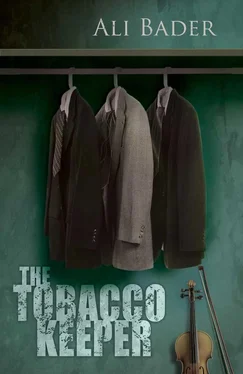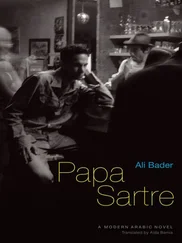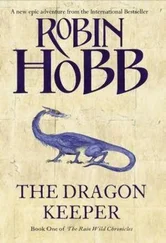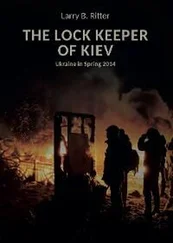‘I want you to bury me here,’ Tahira told him. ‘I want to be buried in Iraq and not in Iran.’
‘No,’ he said. ‘I’m taking you to Tehran.’
‘Listen, I’m already dead. Bury me here.’
The expression on her face told him that she was really dying. After half an hour, she fell into a coma. Some of the refugees nearby said she was dead. Some men insisted on staying with him, while the families with children had to continue walking. After an hour, Tahira left this world and became as cold as ice. But her beautiful pale face remained unchanged while the strands of her soft, blonde hair fluttered in the wind.
One of the refugees that we met in Baghdad, Dr Mohammad Ali, reported that Haidar Salman hadn’t shed a single tear in spite of the heaviness in his heart. With the help of some other men he had dug the earth with his bare hands to make a grave for her. It was hard because they had no shovels and no tools. But they succeeded, even though the hole was not deep. They covered her with a black gown and sprinkled dust on top. Everybody offered their condolences. He didn’t say a word or open his mouth, only stared at the others, feeling that the calamity of death was infinite. The absurdity of the situation bordered on the nonsensical. He felt that words could not express anything, they could only multiply as in an absurd play. Everyone who offered their sympathy to him seemed to be playing a role in a play, with set speeches to give and ready gestures to make. People had become marionettes and reality had became fiction. In a parrot-like fashion they repeated the same phrases, the same conformist statements and the same ready-made ideas without fully understanding. He wished they would keep quiet and say nothing, for they had little to say or share with others. They had no inner existence and nothing but mechanical expressions for such occasions: ‘May she rest in peace’.
He said nothing but felt that his silence unsettled them a little. They didn’t know how to react. At that moment, he had no feelings and didn’t know what to say. He hadn’t just lost Tahira, but his entire existence, his personal world. He became a mere number, a person that might easily be replaced. He was like an empty shell, echoing uselessly. Tahira was gone and Iraq was behind him. Hussein’s destiny was unknown. The environment in which they existed had collapsed. So he prepared himself to become someone else, to become the tobacco keeper.
They walked beneath the cold, winter sun. He suddenly heard the sound of running water and saw trees and farmers’ houses. Men were walking up a grassy hill and the cows were on their way to the fields. Behind him on the left was a pile of wood ready for making charcoal and on the right was a vegetable nursery. There were a few clouds and a flock of birds on the horizon. Life went on, he thought, while Tahira was buried in the dust. Didn’t everyone realize that they would be buried in the same way one day? Nature alone would remain: cruel, silent and constant. It was healing and sorrowful to look at nature, for it alone was eternal and had a monopoly on survival.
Iran emerged on the horizon. The border and the refugee camp appeared. Greenery invaded the earth. The serenity was breathtaking and the cold wind blew from a new land, a land that had to become his new home. Whose decision was it, then? The authorities decided. The director of the play decided. Life was a huge stage where form was often confused with content. Life as he knew it was made up of actors performing roles. Two days earlier, he had been the Iraqi composer Haidar Salman. Today things were different. The old play was over and he had to find himself a new performance. He was about to enter a new world, a new life.
The previous play had been tedious and its speeches lifeless. He had to find a new role that had no comical or satirical elements and no paradoxes, a role that was much clearer.
After the expulsion, he wrote the following to Farida: ‘We must not forget ourselves entirely, even if we surrender to a role that we’ve invented, even when it is incompatible with our personalities, because we have chosen to play that role. But I see that others, instead of playing their roles, are played by them. I wish I could find myself another role and stop playing myself. We often imagine that we control the game, unaware that it actually controls us. We often imagine that we uphold values contrary to those we were raised to uphold. But in truth we are only surrendering to them.’
When he arrived at the refugee camp, he managed to procure for himself a tattered, dark coat with a worn collar and a shirt with soiled edges. His beard was long, his face was pallid and his hair was a mixture of black and white. He had become so thin that his cheekbones were protruding. He walked with confident steps towards the guards’ tent. The Iranians looked different to him: their faces were surly. They carried machine guns and their beards were long. Photographs of political leaders and revolutionary posters were everywhere.
The camp leader spoke to him through the translator by his side.
‘Mr Haidar, you have friends here in Iran. You know that according to Islamic Shariah we have banned songs and depraved music, but we’ve retained classical music. Would you be willing to co-operate with us? We would like you to compose music about the revolution, about the leaders of Islam. We’ll give you everything you want, including Iranian nationality.’
‘I won’t lie to you and say yes. What I really want is to be released from this camp. I know Tehran well and I lived there a long time ago, but I can’t live in a refugee camp.’
The man looked straight at Haidar. He was quite perplexed, but he felt it was useless to try arguing with this tall, thin man who had intelligent, confident eyes. He let out a sigh and said: ‘It’s lucky you’re not a prisoner. You can move out whenever you want, on condition that you don’t become involved in politics. When you need anything, we’ll help you.’
Two days later, he received an Iranian ID card on which his name was written: ‘Haidar Salman Merza, of Iraqi affiliation’. He laughed inside himself at this ridiculous comedy. They also gave him enough tomans to last a whole month. Less than two days after his arrival at the camp, he left and headed directly for Tehran, unlike most Iraqis, who went to Jalalabad.
All he thought about was how to get out of this labyrinth. By hook or by crook he had to find papers to allow him to leave Iran. With clarity of vision, he decided not to stay in the country, but to find a way out. He thought about all this as he walked along Wali al-Asr Street, which had been called Reza Pahlavi Street when he’d walked it for the first time. Ismail al-Tabtabaei’s house was located at the end. It was one of the ironies of fate that he should come now, after the al-Tabtabaeis had completely gone. Ismail, in spite of his advanced years, was detained in a Baghdad prison, all his property and wealth confiscated and charged with collaborating with the Shia movement. His brother Saleh had been executed and his body dumped on the street. Tahira had died during the expulsion. But here he was, at a small café on the main street close to hotel Hazrat Fatima. He examined the waiter who was pouring the tea for him. The man’s beard was long and he looked sullen and morose. Haidar sat, warming his hands with his tea and watching customers as they tossed coins onto the tray of the café owner. They exited onto Joseph Stalin Street, although the name of the street had been changed after the revolution to Sattar Khan, one of the leaders of the Iranian Constitutional Revolution. The new names of the streets meant that he got lost a few times. He also decided to brush up his Persian. Since leaving in the fifties and sixties, his command of the language had deteriorated. To practise his language, he decided to buy a Persian book by Ahmad Shamlou, a favourite poet, as well as a dictionary from a large bookshop on Revolution Avenue.
Читать дальше












